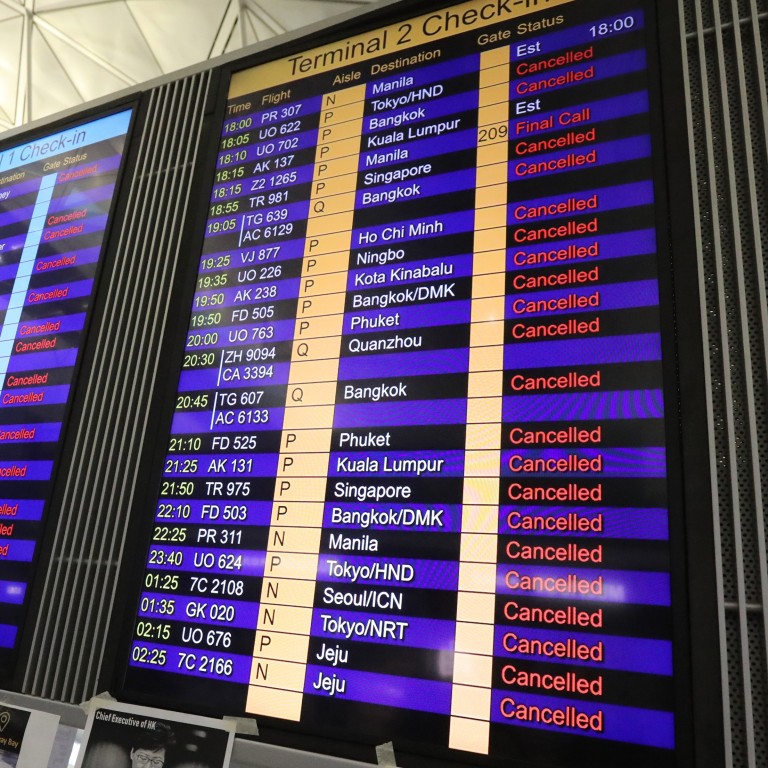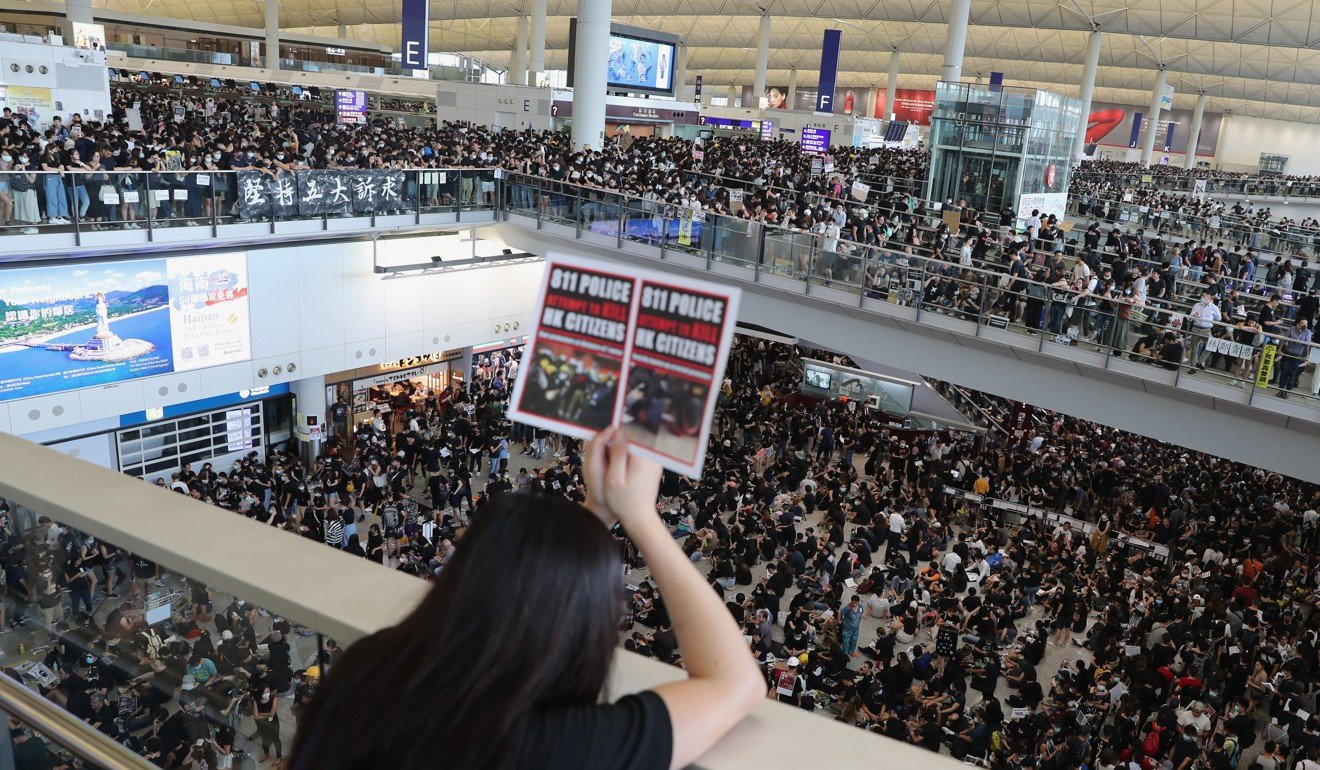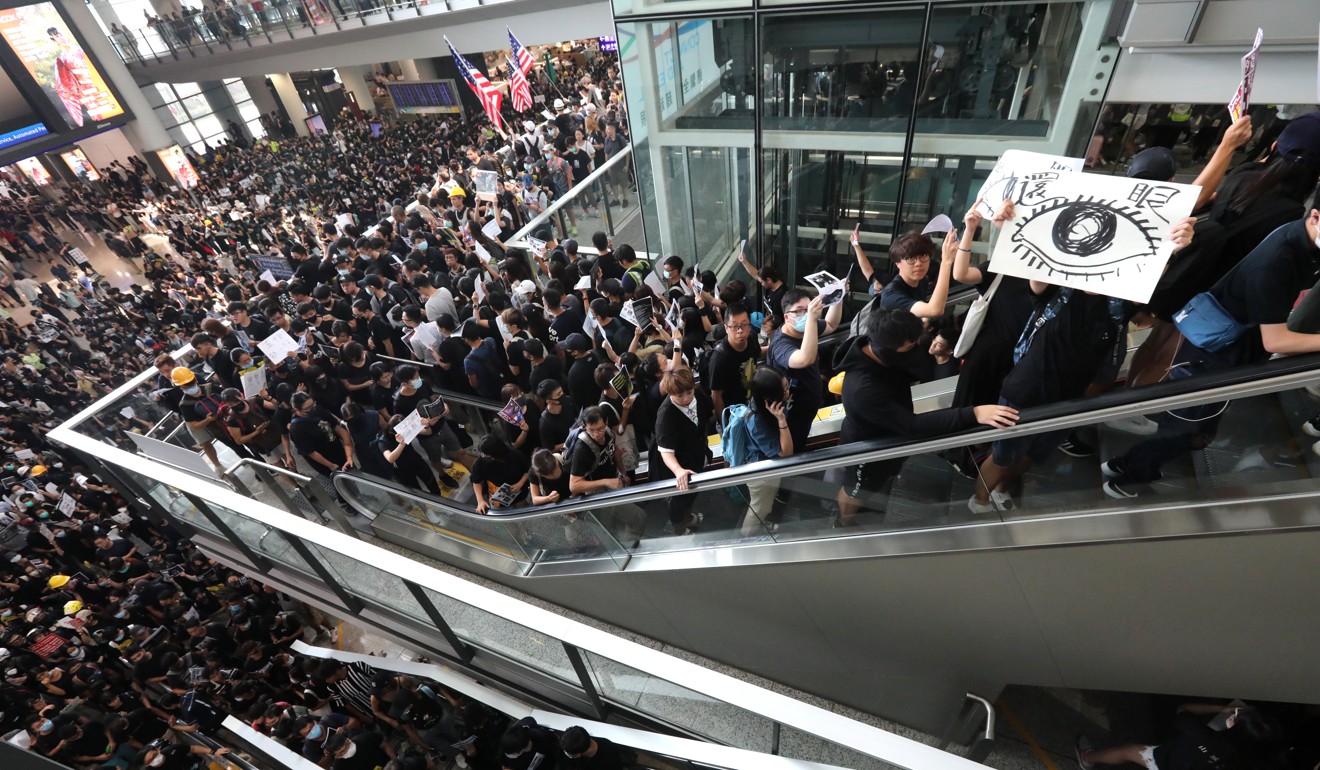
Hong Kong protesters cripple airport as Beijing raises stakes with ‘terrorism’ warning
- Thousands bring Hong Kong International Airport grinding to a halt, leaving 180 flights cancelled and travellers stranded
- Police play down Hong Kong and Macau Affairs Office’s terrorism comments and say they will treat situation like a ‘violent protest’
Thousands of anti-government protesters crippled Hong Kong International Airport on Monday and forced the cancellation of all flights in an unprecedented disruption, even as Beijing raised the stakes by warning that escalating protest violence against police in particular was displaying “signs of terrorism”.
Air travel was thrown into chaos as protesters changed tactics to go beyond the arrival hall and swarm over the departure hall to prevent passengers from checking in or clearing security, forcing the cancellation of all flights in and out of the city.
“All check-in service for departure flights has been suspended. Other than the departure flights that have completed the check-in process and the arrival flights that are already heading to Hong Kong, all other flights have been cancelled for the rest of the day,” the Airport Authority announced at 4pm local time.
Airport officials said they hoped to resume flights from 6am on Tuesday, after more than 180 departures were cancelled.
The impact was severe on one of the world’s busiest airports, which handles 800 flights a day, stranding tens of thousands of travellers trying to fly out of the city or scheduled to arrive.
Many were furious at having to scramble for accommodation or alternative travel arrangements.
Henry Shi, a 24-year-old tourist from Taiwan, complained that protesters were being flippant about their plight.
As it happened: how a fourth day of protests at Hong Kong’s airport crippled flights
“The protesters were making jokes like, ‘The plane is not flying any more,’ and I feel that this is a little inappropriate because the inconvenience is something that affects the travellers,” he said.
“We are willing to accept this protest and bear its consequences, but protesters shouldn’t be using jokes to make fun of us.”
An elderly couple pushing a trolley stacked with luggage were cursed at and heckled by protesters who accused them of “deliberately bumping into people”.

Others were more sympathetic. “I am very upset with the Hong Kong government’s decision to close the airport,” said Andy Chan, 30, who was travelling with his family. “We saw that protests have just been sit-ins and peaceful gatherings.”
It was chaos outside the airport as well, with traffic jams and utter confusion.
Bus and train services were swamped, forcing hundreds of airport staff taking the rest of the day off to walk for almost an hour to the nearest transport facilities in Tung Chung town.
Many of the protesters had to walk the same route as well when they left the airport in droves, chaos achieved and mission accomplished.
They said they were upping the ante and spreading the word about their plight to the wider world after police cracked down hard on violent demonstrations on Sunday, even storming two train stations to chase after retreating protesters.

Many wore eye patches in a show of solidarity with a protester who was hit in the eye by a beanbag round that they say was fired by riot police, although the force said it could not identify the exact cause after watching news and online footage. There have been suggestions that it might have been a projectile fired from a fellow protester’s catapult.
Transport minister Frank Chan Fan said the unprecedented disruption had seriously harmed the reputation of the city and its airport, and appealed to the remaining protesters still camped at the airport to leave as soon as possible.
Combat Hong Kong violent radicals without hesitation or mercy, Beijing says
Weeks of protest violence, including repeated arson attacks on police stations, prompted the State Council’s Hong Kong and Macau Affairs Office to characterise it as “budding shoots of terrorism”, taking its condemnation to a new level.
But police played down Beijing’s characterisation, with Senior Superintendent Steve Li Kwai-wah saying: “Based on the current situation, we will handle it as violent protest.”
Hong Kong was rocked by some of the worst violence on Sunday, with police using tougher tactics as protesters rampaged across parts of Tsim Sha Tsui, Sham Shui Po, Wan Chai and Kwai Chung.
Police fired tear gas at protesters in Kwai Fong MTR station for the first time and charged into Tai Koo station as well, firing pepper balls at close range at the top of a steep escalator as they chased after retreating demonstrators.
They also deployed undercover officers to infiltrate protest crowds and make arrests in Causeway Bay.
While police came under severe criticism, with many accusing them of recklessly putting members of the public in danger, they insisted they were using acceptable and legitimate force.

“It is not a firearm, and using it at such a close range will not have the effect most would expect,” said Terence Mak Chin-ho, assistant commissioner of police in charge of operations, when asked about the close-quarters use of the pepper ball gun in Tai Koo station.
Human rights groups and legal scholars disagreed.
Academic Eric Cheung Tat-ming, a former member of a police watchdog, said the use of force at the two train stations could be potentially criminal if it went against guidelines.
“That already went beyond the intent of stopping any crime when officers made the arrests in the stations,” Cheung said.
Additional reporting by Clifford Lo, Danny Mok and Phila Siu



